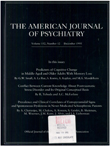Unrecognized cocaine use among schizophrenic patients
Abstract
OBJECTIVE: Unrecognized stimulant use could lead to the misdiagnosis of schizophrenia or the misunderstanding of its course and prognosis. This study was conducted to determine the prevalence of unrecognized stimulant use among patients with a clinical diagnosis of schizophrenia. METHOD: The subjects were 108 schizophrenic patients admitted consecutively to a Veterans Affairs psychiatric hospital. Admitting psychiatrists supplemented routine clinical evaluations with a semistructured interview regarding recent and lifetime use of alcohol, cocaine, amphetamine, marijuana, and opiates. A urine specimen was assayed for the four illicit drugs. RESULTS: Of the 103 patients who provided a urine specimen, 37 (36%) used cocaine during the 6 months before admission, including 31 who used the drug in the week before admission. Because of the poor reliability of negative self- reports of recent cocaine use, clinicians failed to recognize cocaine use in one-third of the patients with a urine toxicology positive for cocaine metabolites. Two other groups of patients were identified; schizophrenic patients without substance abuse (including alcohol) and schizophrenic patients with substance abuse other than stimulants. Both substance-abusing groups were younger than the nonabusing group, but the three groups had similarly high rates of recent psychotic symptoms, homelessness, and unemployment. CONCLUSIONS: Among schizophrenic patients who require hospitalization, clinicians should not rely solely on self-reported stimulant use. Recognition of stimulant use could be improved through routine urine toxicologies for all psychotic patients. The authors suggest that recognition of stimulant use among schizophrenic patients may identify a population with a better prognosis for schizophrenia and different treatment needs.
Access content
To read the fulltext, please use one of the options below to sign in or purchase access.- Personal login
- Institutional Login
- Sign in via OpenAthens
- Register for access
-
Please login/register if you wish to pair your device and check access availability.
Not a subscriber?
PsychiatryOnline subscription options offer access to the DSM-5 library, books, journals, CME, and patient resources. This all-in-one virtual library provides psychiatrists and mental health professionals with key resources for diagnosis, treatment, research, and professional development.
Need more help? PsychiatryOnline Customer Service may be reached by emailing [email protected] or by calling 800-368-5777 (in the U.S.) or 703-907-7322 (outside the U.S.).



